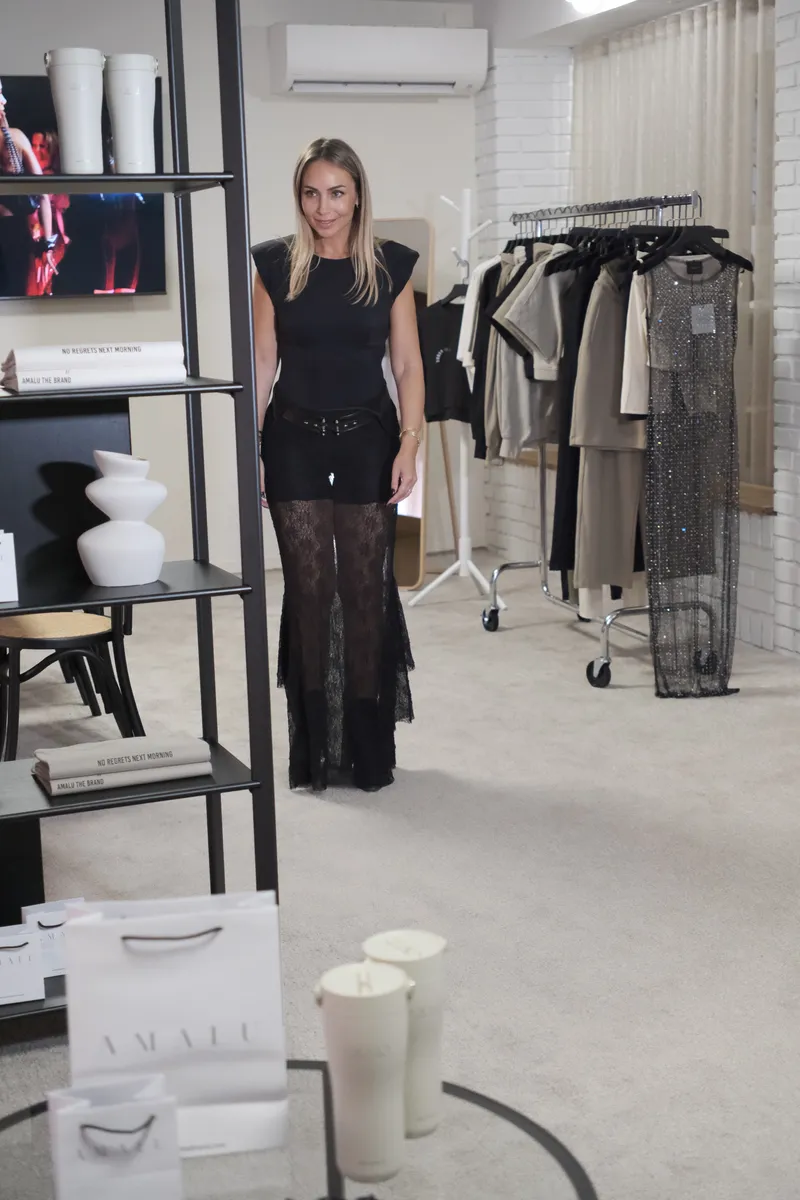Amalu Journal
Interview with our founder: Senka Umek
.jpeg)
The Vision Behind AMALU: A Conversation with Founder Senka Umek
Since launching AMALU in 2022, Senka Umek has been redefining the relationship between movement, fashion, and social spaces. In this exclusive interview, she shares insights into her background, the philosophy driving AMALU, and her vision for the future of both premium activewear and conscious event experiences.
Origins and Inspirations
AMALU Journal: Let's start at the beginning. What led you to create AMALU?
Senka Umek: AMALU emerged from a gap I noticed through personal experience. I've always combined sportswear with more daring fashion pieces, but the market lacked clothing that successfully integrated both—functional pieces for dance and movement that were also refined enough for social settings.
My background spans fashion marketing, event curation, and electronic music, so I was observing this gap from multiple perspectives. I was seeking clothing that could transition between active contexts and social environments without requiring complete outfit changes.
The same observation applied to social spaces, particularly in electronic music culture. I began questioning why electronic music experiences were so intrinsically linked to substance use. Was the music not powerful enough on its own? This questioning eventually led to our SOBER IS FINE event series.
I want AMALU to become a movement, not just a brand—a community where music, dance, and social connection come together without artificial enhancements.
What specific experiences shaped your vision for the brand?
A pivotal moment came during my time organizing electronic music events. I noticed how the dress code for these events was caught between two unsatisfying extremes: either overly casual sportswear that felt underdressed for the social context, or fashion pieces that restricted movement on the dance floor.
Simultaneously, I was observing a growing conversation around substance-free approaches to socializing and celebration, yet most alcohol-free events felt like compromised versions of conventional nightlife rather than experiences designed from first principles.
These observations created the foundation for AMALU's dual identity: a premium motionwear line engineered for movement yet refined enough for social contexts, and the SOBER IS FINE event series celebrating electronic music in substance-free environments.
The Design Philosophy
AMALU's approach to design seems quite distinctive. How would you describe your design philosophy?
I approach design by analyzing how bodies move rather than starting with static sketches. This means examining movement patterns and considering how garments can support rather than restrict expression.
Our design team focuses on several key principles: structural design that supports movement while creating visual lines; versatility that allows transitions between contexts; longevity that transcends seasonal trends; and thoughtful fabric selection that balances technical performance with aesthetic refinement.
A distinctive element of our collection is the integration of corset-inspired structural elements that enhance rather than constrict the body's natural lines. This approach creates garments with both distinctive silhouettes and functional support—pieces that make statements while facilitating freedom.
I'm interested in challenging false dichotomies—between function and fashion, between celebration and clarity. These elements can enhance rather than compromise each other.
How do you balance technical performance with aesthetic considerations?
This balance is central to AMALU's identity. Rather than seeing technical requirements and aesthetic refinement as competing concerns, we view them as complementary elements of a unified approach.
For example, seaming patterns that provide structural support also create visual lines that enhance proportion. Materials selected for their performance characteristics—stretch, recovery, moisture management—are developed in sophisticated colorways and textures.
Our design process involves continuous movement testing throughout development. We don't finalize any piece until it's been evaluated in motion across multiple contexts, from high-intensity movement sessions to social environments.
The SOBER IS FINE Movement
Beyond fashion, AMALU has become known for the SOBER IS FINE event series. What inspired this extension of the brand?
SOBER IS FINE began as a personal experiment. I found myself questioning conventional assumptions about nightlife, particularly the idea that substances are necessary for meaningful celebration and connection.
The name itself—SOBER IS FINE—embodies the understated confidence that defines these gatherings. We didn't want to make grandiose claims about sobriety being superior or transformative. The statement is intentionally modest—not that sober is amazing or revolutionary, but simply that it's fine. This creates permission for people to make choices based on their authentic preferences rather than social expectations.
How does the musical curation for these events differ from conventional approaches?
We select artists who understand how to build a journey through sound. In conventional club settings, DJs often rely on dramatic drops and peak moments to trigger response from audiences whose perception may be altered. In our context, we look for artists who excel at nuance, progression, and storytelling through sound—qualities that are best appreciated with full awareness.
Our events typically feature music with rich melodic elements that engage the mind while moving the body. Genres like melodic techno, deep house, and progressive electronic are common, though the focus is on quality and emotional resonance rather than specific genre boundaries. But we will try to involve all kind of electronic music, I'm sure :)
The most powerful moments on our dance floors occur when the music itself, the quality of movement, and the authenticity of connection generate natural euphoria. Nothing else is needed.
The "classy activewear" dress code seems to connect your fashion and event concepts. Was this intentional?
Absolutely. The dress code emerged from thoughtful consideration of how clothing affects movement, social dynamics, and personal expression in dance environments. We might still be too small to define an official dress code for these kinds of parties but my hope is that one day, it will be something people genuinely embrace.
The conventional clubwear paradigm evolved in contexts where body awareness was often diminished by substances. When creating spaces centered on clarity and conscious movement, we needed to rethink what attire would best support this experience—clothing that allows freedom of movement while maintaining the sophisticated aesthetic that defines AMALU.
This dress code has created a distinctive visual identity for our events while providing a natural context for our garments. It's not simply a marketing alignment but a genuine expression of our integrated philosophy around movement and expression.
Looking Forward
What developments are you most excited about for AMALU's future?
I'm particularly excited about expanding our community aspects. Beyond clothing and events, we're developing AMALU Talks—facilitated conversations that extend our mission into the realm of meaningful dialogue.
On the product side, we're exploring new technical fabrics that further enhance both performance and sustainability. We're also developing pieces that address specific movement modalities beyond electronic music contexts, including yoga and contemporary dance.
For SOBER IS FINE, we're expanding to new cities while developing new format variations. We're particularly interested in daytime events that incorporate natural light and outdoor elements, creating experiences that integrate with rather than escape from everyday life.
Any final thoughts on what you hope people experience when they encounter AMALU?
I hope they experience a sense of permission—permission to seek both function and beauty, both celebration and clarity, both expression and awareness. These aren't opposing values but complementary aspects of a rich, integrated approach to living.
Whether through our garments, our events, or our broader community, I want AMALU to create spaces where people can move freely, connect authentically, and experience fully—where nothing needs to be compromised or diminished for meaningful experience to occur.
At its core, AMALU is about integration rather than separation—bringing together elements often treated as distinct and demonstrating how they can enhance each other when thoughtfully combined.










.jpg)


